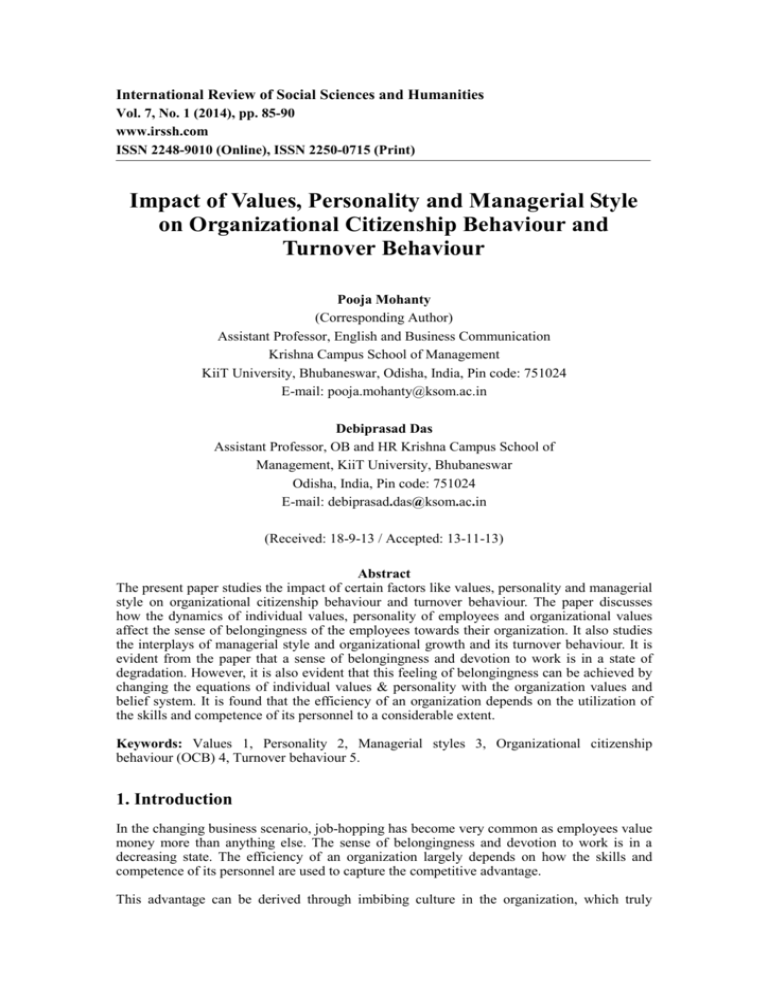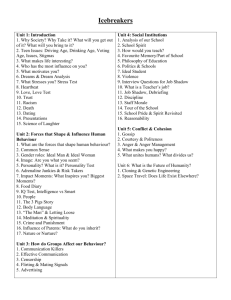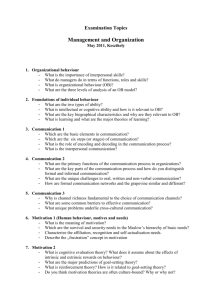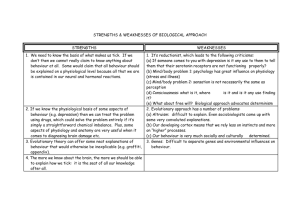Impact of Values, Personality and Managerial Style on
advertisement

International Review of Social Sciences and Humanities Vol. 7, No. 1 (2014), pp. 85-90 www.irssh.com ISSN 2248-9010 (Online), ISSN 2250-0715 (Print) Impact of Values, Personality and Managerial Style on Organizational Citizenship Behaviour and Turnover Behaviour Pooja Mohanty (Corresponding Author) Assistant Professor, English and Business Communication Krishna Campus School of Management KiiT University, Bhubaneswar, Odisha, India, Pin code: 751024 E-mail: pooja.mohanty@ksom.ac.in Debiprasad Das Assistant Professor, OB and HR Krishna Campus School of Management, KiiT University, Bhubaneswar Odisha, India, Pin code: 751024 E-mail: debiprasad.das@ksom.ac.in (Received: 18-9-13 / Accepted: 13-11-13) Abstract The present paper studies the impact of certain factors like values, personality and managerial style on organizational citizenship behaviour and turnover behaviour. The paper discusses how the dynamics of individual values, personality of employees and organizational values affect the sense of belongingness of the employees towards their organization. It also studies the interplays of managerial style and organizational growth and its turnover behaviour. It is evident from the paper that a sense of belongingness and devotion to work is in a state of degradation. However, it is also evident that this feeling of belongingness can be achieved by changing the equations of individual values & personality with the organization values and belief system. It is found that the efficiency of an organization depends on the utilization of the skills and competence of its personnel to a considerable extent. Keywords: Values 1, Personality 2, Managerial styles 3, Organizational citizenship behaviour (OCB) 4, Turnover behaviour 5. 1. Introduction In the changing business scenario, job-hopping has become very common as employees value money more than anything else. The sense of belongingness and devotion to work is in a decreasing state. The efficiency of an organization largely depends on how the skills and competence of its personnel are used to capture the competitive advantage. This advantage can be derived through imbibing culture in the organization, which truly Pooja Mohanty et al. 86 reflects the care for the employees as well as the performance of the organization. Organizational culture represents a common perception held by the organization’s members. It is different from organization to organization and so is the behaviour of the employee. If the organization is inviting in terms of new ideas, it often has participative employees. Frequently employees, whose attitudes and behaviour are compatible with the culture, share the same values that are practised in the organization (Csikszentmihalyi, 1990). They often receive more rewards and show more commitment and loyalty towards the organization. Culture of the organization also influences the employees’ ethical behaviour. 1.1 Impact of Values, Personality and Managerial Styles There may be a disharmony in conditions of employment, if value of a person and that of an organization do not match; and that in turn affects the quality of work life. Involvement of employees’ values and the organizational values in the formulation and implementation of industrial policy is necessary. This way employees’ commitment to the organization can be ensured (Mowday & Baulin, 1974; Shore and Wayne, 1993; Barker, 1999; Utz, 2006; Yoos II and Barker, 2008). Today companies value and practice integrity, enterprise and reliability. Their values can be manifested only if the members of the organization share them. Therefore, they strive to reach a balance between the two. Manifestation of strained relations between employees and management are often reflected in the behaviour of employees. Notable amongst them are apathy, arguments, aggression, hostility, stress, unwillingness to co-operate, resent absenteeism, strikes, etc. According to England & Ice (1974) certain value patterns distinguishes successful managers from unsuccessful managers. Likewise Costa, McRae & Holland (1984) proposed that personal values also play an important role in the choice of one’s career. Personality also plays an important role in the organizational performance. The personality dimensions define the organizational commitment and engagement of the employees (Judge, Bono and Locke, 2000; Judge, Heller and Mount, 2002; Langelaan et al., 2006). Employees’ ability and role perception are also important factors that help in determining how well they would perform. Individual characteristics are one of the factors that affect motivation in organization (Beck, 2003). The effectiveness of an employee depends on his own potential and the role he occupies in the organization. If the role does not allow him to use his competence, an external type (LOC) individual will be frustrated. Externals and internals are two types of personalities defined based on locus of control of the individual (Heider, 1958; Rotter, 1966; Sandoff and Widell, 2008). The locus of control is a continuum and people can be categorized along that continuum. An individual with external control believes that external factors control his life, where as an individual with internal control believes that any happening outside is the outcome of his/her own behaviour or permanent characteristics (Rotter, 1966). Robbins (1997) highlighted that the LOC is also determined by the culture of the organization (Csikszentmihalyi, 1990; Sandoff and Widell, 2001, 2008). If an organization expects an individual to hold responsibility for his/her own behaviour, it should have more internals. The overall evidence indicates that internals’ rate of absence is less and they perform better and they also take more responsibility and hence are more committed towards the organization. Employee productivity is also dependent on the style in which the managers operate in that organization because people in organization are very responsive to praise and encouragement. Managers who find the key to their employees’ inner source of motivation can tap an immense source of productive energy (Muchinsky, 2007). Employees also have a right to be informed of business plans. A responsive, sensitive and involved manager will always provide the much-needed help and support to the employees. This way the organization will have more dedicated employees. International Review of Social Sciences and Humanities, Vol. 7, No. 1 (2014), 85-90 87 Managerial style is very much influenced by the subordinates’ expectations from the organization and their attitudes towards the organization. Managerial style is equally influenced by the degree of freedom in policies governed by the organization. Managers bond the different sub units in an organization. They also direct the links among the subordinates. They define the efficacy and commitment of the subordinates towards the organization. For example, the attributes of what is being appraised are contingent on the object or experience that is being appraised (Zigarmi, Nimpon, Houson, Witt and Diehl, 2009). Such important issues relating to employee management are primarily the responsibility of the manager. Hence, it is mandatory that the manager and his/her managerial style frames the work culture in an organization. In any organization where management is of participative style, employees take responsibility for their own act. Individuals who are of internal types - who take responsibility of their own act - will be more responsible for their actions. And also in organization where values are shared, the work culture and work behaviour will evolve in accordance with each other. Evidently the participative managerial style and shared values promote the loyalty, commitment, obedience and productivity of an employee. This in turn may influence the organizational citizenship behaviour (OCB), which is one of those several terms that have been used to describe flexibility, productivity, participation, organizational innovations, responsiveness and many others-terms concerned with work behaviour. 2. Review of Literature Reciprocation in employee-organization relationship is of vital importance. The more the employee is supported the more he adheres to the organisation’s policies and the absenteeism is less (Fishenberger, Huntington, Hutchison & Sowa, 1986). There is definite relationship found between performance, innovation, attachment to the organization and perceived organizational support. The organization that supports its members frequently values their contribution. Employees’ contribution is often considered as an important correlate of employee behaviour and affective states (Davis-La-Mastro, 1990). Individual with positive attitudes towards their job and organization often manifests positive citizenship behaviour (Organ, 1988). Early OCB researchers defined citizenship behaviour as separate from in-role job performance and emphasized that OCB should be viewed as both extra role and organizationally functional role behavior of the employees. Graham (1991) conceived organizational citizenship as a global concept that includes all positive organizationally relevant behaviours of the individual organizational members. Graham proposed organizational participation as dimension of OCB- after active citizenship behaviour syndrome. The study by O’Reilly, et. al (1991) found that shared values leads to greater satisfaction and higher commitment. The values that are socially sanctioned and non-controversial are easy to share. Organization that shares values with individual creates positive impact and strengthens attachment. Similarly, a long association also tends to create strong organizational tie (McLean, Parks & Rousseau, 1993; Veitch and Cooper-Thomas, 2009; Khandelwal, K. A., 2009). In yet another study commitment is not always due to positive feelings or long associations. Sometimes it may be for rationalizing the past behaviour (Staw & Ross, 1987). In some cases this behaviour will be based on choice and positive effect (Mowday, 1982). Individuals though occupying higher level roles in any organization have more authority and autocracy. This in turn gives them a sense of responsibility and answerability for their actions and decisions. Hence high level executive/managers are found to have higher levels of organizations commitment than those at lower levels (Mowday, 1982; Mathieu and Zajac, 1990; Eby, 1999; Judge et al., 2000; Judge and Ilies, 2004; Meyer, Becker and Vandenberghe, Pooja Mohanty et al. 88 2004). The person whose values match the operating values of the organization would be more committed to the organization (Peter, Steers, Mowday & Boulian, 1974). An organizations value system should be assessed from the employee’s standpoint to foster the value fit between the two (O’Reilly, Chatman, Caldwell, 1991). Individual’s perception of organizational value is more important to predict individual’s behaviour (Judge & Cable, 1997; Sandoff and Widell, 2008). Value system also influences the ethical behaviour of individual in work place (Finegan, 1994). Besides influencing the individuals’ behaviour, personal values also influence the corporate strategic decision-making (Guth & Taigiri, 1965). Locus of control is another important factor in decision making, in directing employees’ and job satisfaction at all level. The greater the fit between the locus of control of the employee and supervisor’s initiating structure, the greater is the commitment (Luthans, Baack & Taylor, 1987). Personal control is an individual’s belief that he/she can affect a change in a desired direction, on the organizations’ environment. The enhanced perceived control strengthens the emotional bonds with an organization (Lawler, 1992; Sandoff and Widell, 2001, 2008). The managerial style has also been found to affect the commitment of the subordinates. (Myers, 1970) He emphasized that the managers who insists on using the influence of official authority in today’s enlightened society are frustrated by negative reactions to his attempted use of arbitrary direction and control, no matter how technically correct and logically insightful he/she is, which leads to negative outcomes. It is evident from above findings that OCB are affected by: a) b) c) Personality Variables Personal Values Managerial Styles followed in the organization The present study will focus on interaction effect of the above variables on OCB, i.e., on dimensions of loyalty, commitment and obedience. On the basis of above studies, it is evident that early researchers did not focus upon the individual attributes that may contribute towards the development of OCB. The present study would be able to bridge the gap between OCB and the influence it has by the individual characteristics. It would provide an understanding of interrelationship between variables of personality, values, managerial style and organizational citizenship behaviour (OCB). 2.1 Operationalization of the Factors Personal values in this study are concerned with how an employee personally values his/her job, the work climate, and his/her self. In the present study it is studied under eleven factorsFinancial Benefits, Non financial Benefits, Opportunities for Developments and promotion, Opportunities for Responsible and Independent Action, Job and Personal security, Type or kind of work, Job according to interests and abilities, Supervisor-Supervision Management, Conduct with Co-workers and Subordinates, Recognition and Appreciation for Accomplishment of job, and Working Conditions which also effects the turnover. In the present study personality is catagorized into two types based on locus of control (Heider, 1958; Rotter, 1961). Internals are individuals who take the responsibility of whatever happens to them, in and around the organization. Externals are individuals who mostly hold external factors responsible for whatever happens to them. In this study locus of control relates to seven areas: general, success or effectiveness, influence, acceptability, career, advancement and rewards. International Review of Social Sciences and Humanities, Vol. 7, No. 1 (2014), 85-90 89 A manager's main motivation is revealed by his main concern. The backup and dominant motive in his style indicates what climate he is likely to promote in his department. Six primary motives are studied for understanding the dynamics of behaviour. a) b) c) d) e) f) Achievement motive- characterised by a concern for excellence and competition. Affiliation motive- characterised by a concern for establishing and maintaining a close personal relationship. Influence motive- characterised by a concern for making an impact on others. Control motive- characterised by a concern for orderliness. Extension motive- characterised by a concern for being useful to others. Dependency motive- characterised by a concern for seeking direction, guidance and help from others. Organizational citizenship behaviour denotes how an individual belongs to the organization. In this study three dimensions are undertaken to assess employees’ belongingness- a) Organizational Obedience- defined through acts as how employee carry on with orders, adheres to policies, how rules are accepted & job responsibilities fulfilled. b) Organizational Loyalty- defined by how employees identify himself/herself with the organization. How he/she identifies with leaders, growth, groups and interests of the organization. c) Organizational Participation - defined by employees’ involvement in policy making, governing policies of the organization. Employees’ interests in organizational affairs and organization’s effort in keeping employees informed of the same, defines participation (Van Dyne, Graham and Dienesch, 1994). Implications of the study are that in recent years the work behaviour within the organization that is un-measureable by traditional tools has caught attention of many theorists, as the global competition is all about innovation, flexibility, productivity, responsiveness and belongingness. In the last decade many terms have been used to describe such behaviour; such as, prosocial organizational behaviour (Brief & Motovillo, 1986), Extra role behaviour (Van Dyne & Cummings, 1990), Organizational spontaneity (George & Brief, 1992), Counter role behaviour (Staw & Boettger, 1990), and Organizational citizenship behaviour (Graham, 1991; Organ,1988). Acknowledgement A good number of book and journals have helped us write this paper. We are thankful to the KSOM Library for the huge repository of journals and books it has which guided us through the paper. We are also grateful to the guidelines provided by the IRSSH journal for a proper presentation of the paper. References [1] [2] [3] [4] [5] [6] [7] [8] R.C. Beck, Personality and Individual Differences, Motivation: Theories and Principles, (2003), Upper Saddle River, NJ: Prentice Hall. P.T. Costa, R.R. MaCrae and J.L. Holland, Personality and vocational interests in an adult sample, Journal of Applied Psychology, 69(1984), 390-400. M. Csikszetmihalyi, The Psychology of Optimum Experience, (1990), New York: Harper and Row. L.T. Eby, Motivational basis of affective organizational commitment: A partial test of an integrative theoretical model, Journal of Occupational and Organizational Psychology, 72(1999), 463-483. G. England and R. Lee, The relationship between managerial values and managerial in the United States, Japan, India and Australia, Journal of Applied Psychology, 59(1974), 411-419. J.E. Finegan, The impact of personal values on judgements of ethical behaviour in the work place, Journal of Business Ethics, 13(1994), 747-755. W. Guth and R. Taigiri, Personal values and corporate strategies, Harvard Business Review, 43(1965), 123-132. F. Heider, The Psychology of Interpersonal Relations, (1958), New York: Wiley. Pooja Mohanty et al. [9] [10] [11] [12] [13] [14] [15] [16] [17] [18] [19] [20] [21] [24] [25] [26] [27] [28] [29] 90 T.A. Judge, J.E. Bono and E.A. Locke, Personality and job Satisfaction: The mediating role of job characteristics, Journal of Applied Psychology, 85(2000), 237249. T.A. Judge, D. Heller and M.K. Mount, Five-factor model of personality and job satisfaction: A meta-analysis, Journal of Applied Psychology, 87(2002), 530-541. T.A. Judge and R. Ilies, Affect and job satisfaction: A study of their relationship at home and work, Journal of Applied Psychology, 89(2004), 661-673. K.A. Khandelwal, Organizational commitment in multinationals: A dynamic interplay among personal, organizational and societal factors, ASBM Journal of Management, 2(1) (2009), 99-122. S. Langelaan, A.B. Bakker, L.J.P. van Doornen and W.B. Schaufeli, Burnout and work engagement: Do individual differences make a difference? Personality and Individual Differences, 40(2006), 521-532. F. Luthans, D. Baack and L.A. Taylor, Organizational commitment: Analysis of antecedent, Human Relations, 40(1987), 219-235. J.E. Mathieu and D.M. Zajac, A review and meta-analysisof the antecedents, correlates and consequences of organizational commitment, Psychological Bulletin, 108(1990), 171-194. J.P. Meyer, T.E. Becker and C. Vandenberghe, Employee commitment and motivation: A conceptual analysisand integrative model, Journal of Applied Psychology, 89(2004), 991-1007. P.M. Muchinsky, Psychology Applied to Work, (2008), Hypergraphic Press. C.A. O'Reilly, J. Chatman and D.F. Caldwall, People and organization culture: A profile comparison approach to assesing person-organization fit, Academy of Management Journal, 34(1991), 487-516. Porter, Steers, Mowday and Baulin, Organizational commitment, job satisfaction and turnover among psychiatric technicians, Journal of Applied Psychology, 59(1974), 603-609. J.B. Rotter, Generalised expectancies for internal versus external control of locus of reinforcement, Psychological Monographs, 80(1966), 609. M. Sandoff and G. Widell, Coping at work: With freedom or with docility? A model developed with examples from risky work places, Journal of Human Values, 14(2) (2008), 157-167. L.M. Shore and S.J. Wayne, Commitment and employee behaviour: Comparison of affective commitment and continuance commitment with perceived organizational support, Journal of Applied Psychology, 78(1993), 80-774. J.L. Utz, Representations, warranties and covenants relating to employee benefit plans, Journal of Pension Planning and Compliance, 32(3) (2006), 1-12. L. Van Dyne, J. Graham and P. Dienesch, Organizational citizenship behaviour: Construct redefinition, measurement and validation, Academy of Management Journal, 37(4) (1994), 765-802. R.W.D. Veitch and H.D. Cooper-Thomas, Tit for tat? Predictors of temporary agency worker’s commitments, Asia Pacific Journal of Human Resources, 47(3) (2009), 318334. C.J. Yoos II and J.R. Barker, Convenons! We owe our store to the company’s soul, Journal of Human Values, 14(2) (2008), 141-154. D. Zigarmi, K. Nimon, D. Houson, D. Witt and J. Diehl, Beyond engagement: Toward a framework and operational definition for employee work passion, Human Resource Development Review, 8(3) (2009), 300-321.






